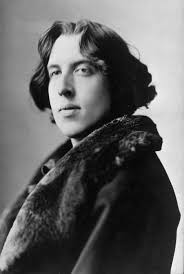The Picture of Dorian Gray Page #42
The Picture of Dorian Gray is a Gothic and philosophical novel by Oscar Wilde, first published complete in the July 1890 issue of Lippincott's Monthly Magazine. Fearing the story was indecent, prior to publication the magazine's editor deleted roughly five hundred words without Wilde's knowledge.
There was a horrible fascination in them all. He saw them at night, and they troubled his imagination in the day. The Renaissance knew of strange manners of poisoning--poisoning by a helmet and a lighted torch, by an embroidered glove and a jewelled fan, by a gilded pomander and by an amber chain. Dorian Gray had been poisoned by a book. There were moments when he looked on evil simply as a mode through which he could realize his conception of the beautiful. CHAPTER 12 It was on the ninth of November, the eve of his own thirty-eighth birthday, as he often remembered afterwards. He was walking home about eleven o'clock from Lord Henry's, where he had been dining, and was wrapped in heavy furs, as the night was cold and foggy. At the corner of Grosvenor Square and South Audley Street, a man passed him in the mist, walking very fast and with the collar of his grey ulster turned up. He had a bag in his hand. Dorian recognized him. It was Basil Hallward. A strange sense of fear, for which he could not account, came over him. He made no sign of recognition and went on quickly in the direction of his own house. But Hallward had seen him. Dorian heard him first stopping on the pavement and then hurrying after him. In a few moments, his hand was on his arm. "Dorian! What an extraordinary piece of luck! I have been waiting for you in your library ever since nine o'clock. Finally I took pity on your tired servant and told him to go to bed, as he let me out. I am off to Paris by the midnight train, and I particularly wanted to see you before I left. I thought it was you, or rather your fur coat, as you passed me. But I wasn't quite sure. Didn't you recognize me?" "In this fog, my dear Basil? Why, I can't even recognize Grosvenor Square. I believe my house is somewhere about here, but I don't feel at all certain about it. I am sorry you are going away, as I have not seen you for ages. But I suppose you will be back soon?" "No: I am going to be out of England for six months. I intend to take a studio in Paris and shut myself up till I have finished a great picture I have in my head. However, it wasn't about myself I wanted to talk. Here we are at your door. Let me come in for a moment. I have something to say to you." "I shall be charmed. But won't you miss your train?" said Dorian Gray languidly as he passed up the steps and opened the door with his latch-key. The lamplight struggled out through the fog, and Hallward looked at his watch. "I have heaps of time," he answered. "The train doesn't go till twelve-fifteen, and it is only just eleven. In fact, I was on my way to the club to look for you, when I met you. You see, I shan't have any delay about luggage, as I have sent on my heavy things. All I have with me is in this bag, and I can easily get to Victoria in twenty minutes." Dorian looked at him and smiled. "What a way for a fashionable painter to travel! A Gladstone bag and an ulster! Come in, or the fog will get into the house. And mind you don't talk about anything serious. Nothing is serious nowadays. At least nothing should be." Hallward shook his head, as he entered, and followed Dorian into the library. There was a bright wood fire blazing in the large open hearth. The lamps were lit, and an open Dutch silver spirit-case stood, with some siphons of soda-water and large cut-glass tumblers, on a little marqueterie table. "You see your servant made me quite at home, Dorian. He gave me everything I wanted, including your best gold-tipped cigarettes. He is a most hospitable creature. I like him much better than the Frenchman you used to have. What has become of the Frenchman, by the bye?" Dorian shrugged his shoulders. "I believe he married Lady Radley's maid, and has established her in Paris as an English dressmaker. Anglomania is very fashionable over there now, I hear. It seems silly of the French, doesn't it? But--do you know?--he was not at all a bad servant. I never liked him, but I had nothing to complain about. One often imagines things that are quite absurd. He was really very devoted to me and seemed quite sorry when he went away. Have another brandy-and-soda? Or would you like hock-and-seltzer? I always take hock-and-seltzer myself. There is sure to be some in the next room." "Thanks, I won't have anything more," said the painter, taking his cap and coat off and throwing them on the bag that he had placed in the corner. "And now, my dear fellow, I want to speak to you seriously. Don't frown like that. You make it so much more difficult for me." "What is it all about?" cried Dorian in his petulant way, flinging himself down on the sofa. "I hope it is not about myself. I am tired of myself to-night. I should like to be somebody else." "It is about yourself," answered Hallward in his grave deep voice, "and I must say it to you. I shall only keep you half an hour." Dorian sighed and lit a cigarette. "Half an hour!" he murmured. "It is not much to ask of you, Dorian, and it is entirely for your own sake that I am speaking. I think it right that you should know that the most dreadful things are being said against you in London." "I don't wish to know anything about them. I love scandals about other people, but scandals about myself don't interest me. They have not got the charm of novelty." "They must interest you, Dorian. Every gentleman is interested in his good name. You don't want people to talk of you as something vile and degraded. Of course, you have your position, and your wealth, and all that kind of thing. But position and wealth are not everything. Mind you, I don't believe these rumours at all. At least, I can't believe them when I see you. Sin is a thing that writes itself across a man's face. It cannot be concealed. People talk sometimes of secret vices. There are no such things. If a wretched man has a vice, it shows itself in the lines of his mouth, the droop of his eyelids, the moulding of his hands even. Somebody--I won't mention his name, but you know him--came to me last year to have his portrait done. I had never seen him before, and had never heard anything about him at the time, though I have heard a good deal since. He offered an extravagant price. I refused him. There was something in the shape of his fingers that I hated. I know now that I was quite right in what I fancied about him. His life is dreadful. But you, Dorian, with your pure, bright, innocent face, and your marvellous untroubled youth--I can't believe anything against you. And yet I see you very seldom, and you never come down to the studio now, and when I am away from you, and I hear all these hideous things that people are whispering about you, I don't know what to say. Why is it, Dorian, that a man like the Duke of Berwick leaves the room of a club when you enter it? Why is it that so many gentlemen in London will neither go to your house or invite you to theirs? You used to be a friend of Lord Staveley. I met him at dinner last week. Your name happened to come up in conversation, in connection with the miniatures you have lent to the exhibition at the Dudley. Staveley curled his lip and said that you might have the most artistic tastes, but that you were a man whom no pure-minded girl should be allowed to know, and whom no chaste woman should sit in the same room with. I reminded him that I was a friend of yours, and asked him what he meant. He told me. He told me right out before everybody. It was horrible! Why is your friendship so fatal to young men? There was that wretched boy in the Guards who committed suicide. You were his great friend. There was Sir Henry Ashton, who had to leave England with a tarnished name. You and he were inseparable. What about Adrian Singleton and his dreadful end? What about Lord Kent's only son and his career? I met his father yesterday in St. James's Street. He seemed broken with shame and sorrow. What about the young Duke of Perth? What sort of life has he got now? What gentleman would associate with him?"
Translation
Translate and read this book in other languages:
Select another language:
- - Select -
- 简体中文 (Chinese - Simplified)
- 繁體中文 (Chinese - Traditional)
- Español (Spanish)
- Esperanto (Esperanto)
- 日本語 (Japanese)
- Português (Portuguese)
- Deutsch (German)
- العربية (Arabic)
- Français (French)
- Русский (Russian)
- ಕನ್ನಡ (Kannada)
- 한국어 (Korean)
- עברית (Hebrew)
- Gaeilge (Irish)
- Українська (Ukrainian)
- اردو (Urdu)
- Magyar (Hungarian)
- मानक हिन्दी (Hindi)
- Indonesia (Indonesian)
- Italiano (Italian)
- தமிழ் (Tamil)
- Türkçe (Turkish)
- తెలుగు (Telugu)
- ภาษาไทย (Thai)
- Tiếng Việt (Vietnamese)
- Čeština (Czech)
- Polski (Polish)
- Bahasa Indonesia (Indonesian)
- Românește (Romanian)
- Nederlands (Dutch)
- Ελληνικά (Greek)
- Latinum (Latin)
- Svenska (Swedish)
- Dansk (Danish)
- Suomi (Finnish)
- فارسی (Persian)
- ייִדיש (Yiddish)
- հայերեն (Armenian)
- Norsk (Norwegian)
- English (English)
Citation
Use the citation below to add this book to your bibliography:
Style:MLAChicagoAPA
"The Picture of Dorian Gray Books." Literature.com. STANDS4 LLC, 2024. Web. 27 Nov. 2024. <https://www.literature.com/book/the_picture_of_dorian_gray_869>.




Discuss this The Picture of Dorian Gray book with the community:
Report Comment
We're doing our best to make sure our content is useful, accurate and safe.
If by any chance you spot an inappropriate comment while navigating through our website please use this form to let us know, and we'll take care of it shortly.
Attachment
You need to be logged in to favorite.
Log In